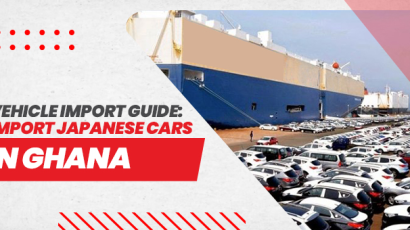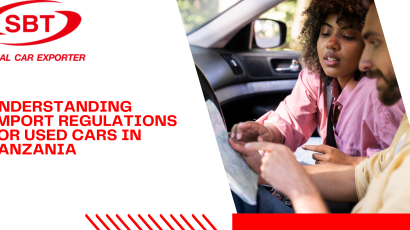
Importing a car from Japan to Africa is an exciting opportunity for buyers looking to access reliable, high-quality, and cost-effective vehicles. Japan’s automotive industry is popular for its durability, innovative technology, and wide selection of cars. However, navigating the process requires careful planning and an understanding of the necessary paperwork. So, whether you’re importing a car to Kenya, South Africa, Nigeria, or another African country, having the correct documentation is crucial.
Therefore, this guide breaks down the essential documents you need, highlights country-specific requirements, and provides tips to make the process smoother. So, let’s explore everything you need to know to successfully import a car from Japan to Kenya.
Why Import Cars from Japan?
Before diving into the paperwork, it’s essential to understand why Japan is a preferred choice for many African buyers. Following are some reasons people prefer importing a car from Japan:
Variety of Options: Japanese car auctions offer an extensive range of makes and models.
Affordable Pricing: Cars from Japan are often cheaper compared to local options, even after shipping and taxes.
Reliability: Japanese cars are well-maintained due to strict inspection standards.
Now, let’s look at the key import car documents for South Africa.
Essential Documents for Importing Cars from Japan
To ensure a seamless import process, the following documents are generally required across most African countries:
1. Purchase Invoice
This document proves you’ve purchased the vehicle. As a result, it will include details like the car’s price, seller’s information, and transaction date.
2. Export Certificate
Issued by Japanese authorities, this certificate provides details about the car’s specifications, previous ownership, and legal clearance for export.
3. Bill of Lading (BOL)
The Bill of Lading is a critical shipping document that serves as proof that the car is being transported to your chosen destination. Therefore, it includes details about the shipment, such as the port of departure, port of entry, and consignee’s information.
4. Inspection Certificate
Most African countries require an inspection certificate, such as a JEVIC (Japan Export Vehicle Inspection Certificate) or a QISJ (Quality Inspection Services Japan). These certificates confirm the car’s roadworthiness and compliance with environmental standards.
5. Insurance Documents
Marine insurance protects your car during transit, ensuring coverage in case of damage or loss.
6. Customs Clearance Documents
Once the car reaches the port of entry, you’ll need to present customs clearance forms, including the declaration of the car’s value and any applicable duties or taxes.
7. Identification Documents
Lastly, personal identification, such as a passport or national ID, is necessary to verify the consignee’s identity.
Country-Specific Requirements
Kenya: Importing Cars from Japan
If you’re planning to import a car from Japan to Kenya, the following documents are essential:
Certificate of Conformity (CoC): This certifies that the vehicle meets Kenyan Bureau of Standards (KEBS) requirements.
Logbook: A copy of the vehicle’s logbook is needed for registration purposes.
Import Declaration Form (IDF): This is issued by the Kenyan Revenue Authority (KRA).
Tax Payment Receipts: Duties and taxes, including excise duty, import duty, and VAT, must be settled before the car is released.
Furthermore, the Kenyan government also restricts car imports to vehicles not older than eight years from the date of manufacture. Therefore, ensure compliance to avoid complications.
South Africa: Car Import Paperwork
South Africa has stringent regulations for car imports. The documents required include:
Import Permit: Obtainable from the Department of Trade, Industry, and Competition (DTIC).
Letter of Authority (LOA): Issued by the National Regulator for Compulsory Specifications (NRCS), this document certifies the vehicle’s compliance with South African standards.
Non-Resident Letter: If you’re a foreigner, you’ll need a letter confirming your temporary residence status.
Vehicle Registration Certificate: This document from Japan is required for local registration.
Furthermore, South Africa often permits car imports for specific categories such as vintage cars, special-purpose vehicles, or returning residents.
Nigeria: Car Import Paperwork
When importing a car to Nigeria, the following are the important car import paperwork for Nigeria:
Form M: A mandatory document initiated online via the Nigerian Single Window for Trade platform.
Pre-Arrival Assessment Report (PAAR): Issued by Nigeria Customs Service, this report assesses the car’s duty payable.
Clean Report of Inspection (CRI): Ensures that the car meets Nigerian standards.
Customs Duty Receipt: Proof that you’ve paid the required duties and taxes.
Additionally, Nigeria places no restrictions on vehicle age, but older vehicles may incur higher customs duties.
Additional Tips for Smooth Importation
Understand Tax and Duty Structures
Each country has its own tax and duty requirements, which may include import duty, VAT, excise duty, and environmental levies. Therefore, familiarize yourself with these costs so you can budget effectively.
Work with Reliable Agents
Hiring a trusted clearing agent or freight forwarder can streamline the process. Moreover, they can help with documentation, shipping, and customs clearance.
Verify the Car’s History
Before making a purchase, check the car’s history for any accident records or outstanding loans. This ensures you’re buying a clean and legitimate vehicle.
Choose a Trusted Auction House
Reputable auction houses in Japan, such as USS or JAAI, provide reliable cars and transparent bidding processes.
Wrapping Up
In summary, importing a car from Japan to Africa can be a rewarding experience if you are ready with the right documents. However, each country has specific requirements, and understanding them is essential to avoid delays or penalties. Therefore, whether you’re importing a car to Kenya, South Africa, or Nigeria, gathering the right documents—like the export certificate, Bill of Lading, and inspection certificates—is the key to success.
All in all, by staying informed, working with trustworthy agents, and complying with local regulations, you can enjoy a hassle-free process and drive your dream car in no time. Make your next move with confidence and start your journey to import your car from Japan today!










